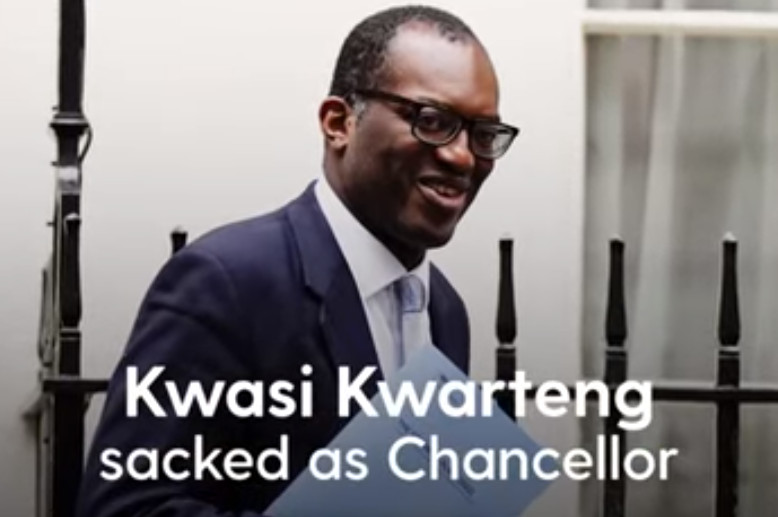
OVERVIEW
MANAGEMENT
PERFORMANCE
POSSIBILITIES
CAPITALS
ACTIVITIES
ACTORS
BURGESS
|
UK POLITICS
LIZ TRUSS / KWASI KWARTENG Daily Mail: Breaking: Liz Truss just sacked Kwasi Kwarteng as Chancellor Original article: https://www.nytimes.com/live/2022/10/14/world/uk-finance-minister-truss-kwarteng#kwasi-kwarteng-uk-chancellor-tax Peter Burgess COMMENTARY Peter Burgess | ||
Breaking: Liz Truss just sacked Kwasi Kwarteng as Chancellor
Daily Mail
Oct 14, 2022
2.15M subscribers ... 1,375 views ... 80 likes
Breaking: Liz Truss just sacked Kwasi Kwarteng as Chancellor | Liz Truss just sacked Kwasi Kwarteng as Chancellor | Kwasi Kwarteng said he has accepted Liz Truss´s request he 'stand aside' as Chancellor. Kwasi Kwarteng has been sacked as Chancellor after returning from a visit to the US on Friday.
#liztruss #kwasikwarteng #ukpolitics #uknews #primeminister #dailymail
Original article: https://www.nytimes.com/live/2022/10/14/world/uk-finance-minister-truss-kwarteng NYTLive Updates: U.K. Government Reverses Course on Fiscal Plan That Rattled Markets Oct. 14, 2022, 11:08 a.m. ET 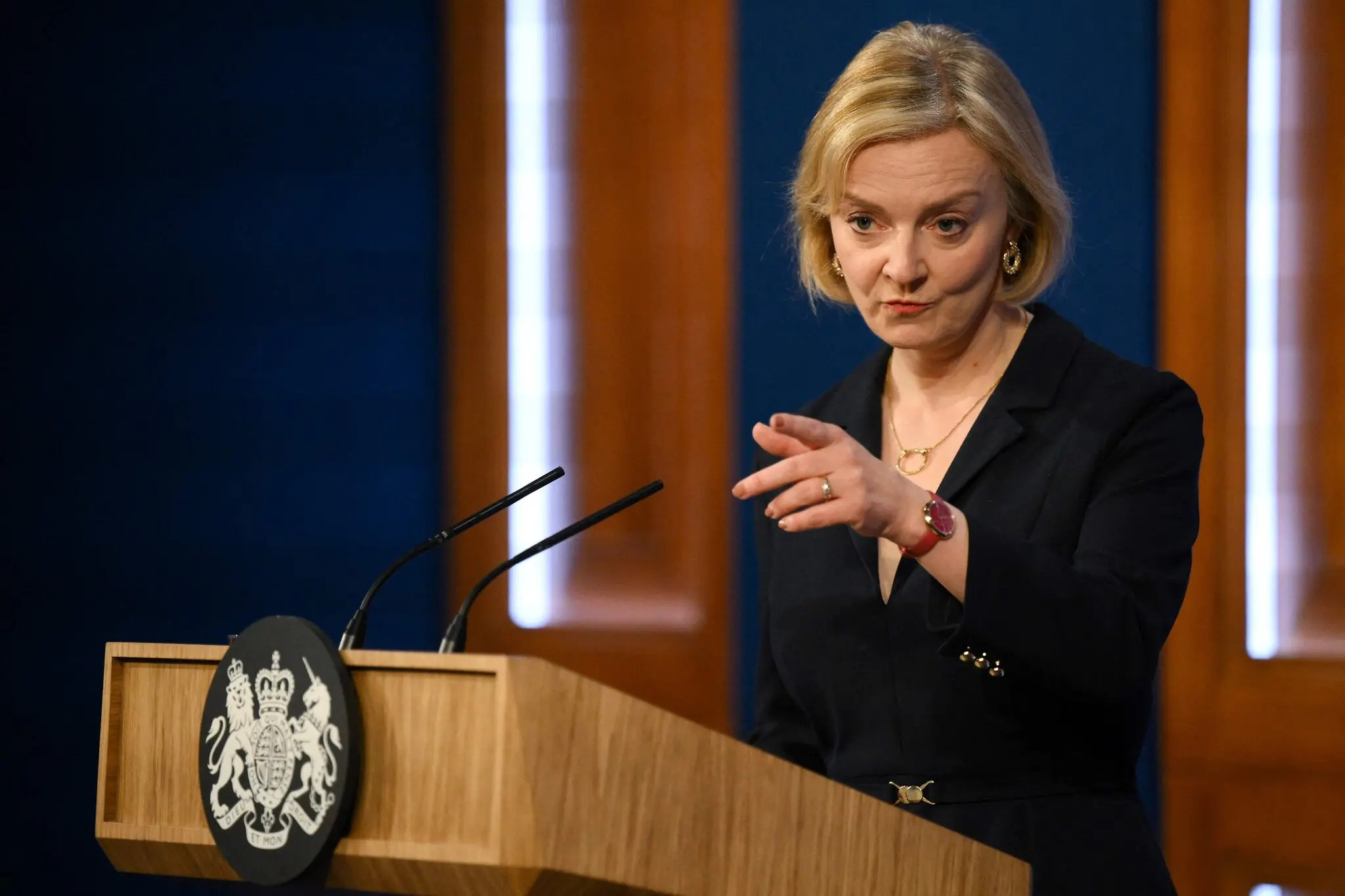
Britain’s Prime Minister Liz Truss held a press conference in the Downing Street Briefing Room in central London on Friday.Credit...Daniel Leal/Agence France-Presse, via Pool/Afp Via Getty Images Here’s what we know:
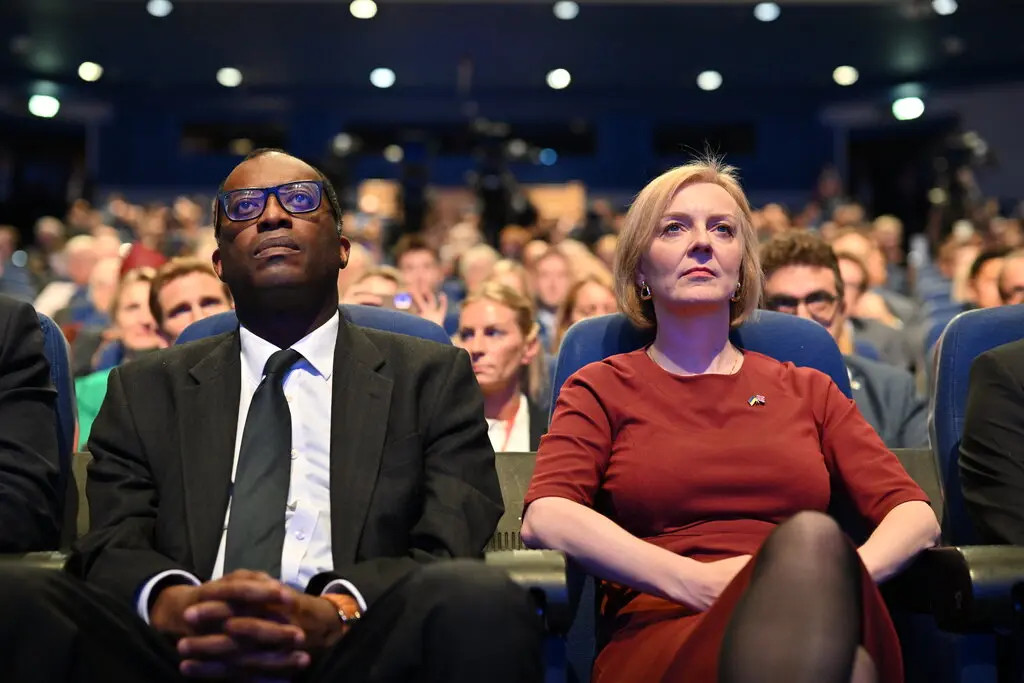
Prime Minister Liz Truss and Kwasi Kwarteng, who was then chancellor of the Exchequer, at a Conservative Party conference this month in Birmingham, England.Credit...Leon Neal/Getty Images LONDON — In a stark retreat, Prime Minister Liz Truss of Britain on Friday fired her finance minister and partly reversed a tax plan that had rattled global financial markets, unsettled investors and set off a spiraling crisis that still threatens her political survival. In a brief news conference from Downing Street, she vowed to raise the country’s corporate tax rate after promising last month not to do so. The increased taxes will help pay for other tax cuts she had initiated and are meant to calm investors, who worried that the cuts were unfunded. “It is clear that parts of our mini budget went further and faster than markets were expecting,” Ms. Truss said, adding, “We need to act now to reassure the markets.” Ms. Truss said that corporate taxes would rise by £18 billion, or $20 billion, which would act as a “down payment” and help restore confidence. But she declined to apologize for the turmoil of recent weeks, and insisted that she remained committed to her objective of spurring economic growth. The reversal of policy on corporate taxes had been widely expected, but Ms. Truss made no mention in her news conference of any further changes — for example, over her plan to reduce the basic income tax rate. The statement follows three weeks of turbulence after an announcement last month by the chancellor of the Exchequer, Kwasi Kwarteng, that sent the currency plunging and government borrowing costs soaring. Earlier Friday, Ms. Truss fired Mr. Kwarteng. Asked on Friday afternoon about why she was staying in office when Mr. Kwarteng was leaving, she said, “My priority is making sure we deliver the economic stability that our country needs.” Downing Street announced that the new chancellor of the Exchequer was Jeremy Hunt, a former health and foreign secretary. With Mr. Hunt considered a pragmatist and moderate, his appointment seemed intended to reassure financial markets. Initial reaction to Ms. Truss’s media conference suggested that she may not have done enough to calm a crisis that has threatened her leadership, however. On Twitter, one former Conservative cabinet minister, David Gauke, wrote simply: “That won’t do.” Her firing of Mr. Kwarteng also failed to lift the British pound or advance gains made by government bonds. The course change had looked increasingly inevitable in light of the reactions in the markets and among politicians. It amounts to a humiliating decision for Mr. Kwarteng and Ms. Truss, whose promise to cut taxes helped her win the leadership of the Conservative Party in the battle to succeed Boris Johnson as prime minister. As the crisis gathered pace, Mr. Kwarteng was forced to cut short a visit to Washington for talks at the International Monetary Fund and return on Friday to London. He was fired shortly afterward. Ms. Truss has been in power for less than six weeks, but on Thursday, the foreign secretary, James Cleverly, felt compelled to warn colleagues against trying to remove her, saying that “changing the leadership would be a disastrously bad idea.” Mr. Kwarteng announced the government’s tax-cutting plan on Sept. 23, and he and Ms. Truss had already been forced to retreat from one element of their proposal, shelving plans to reduce income taxes for the highest earners. But the move failed to restore calm. Britain’s central bank, the Bank of England, has intervened in the debt market, fearing that developments there could threaten some pension funds, which were particularly vulnerable. But it planned to end that intervention on Friday, adding urgency to the government’s task of restoring confidence. — Stephen Castle and Eshe Nelson Skeptics call for re-evaluating entire package of unfunded tax cuts. 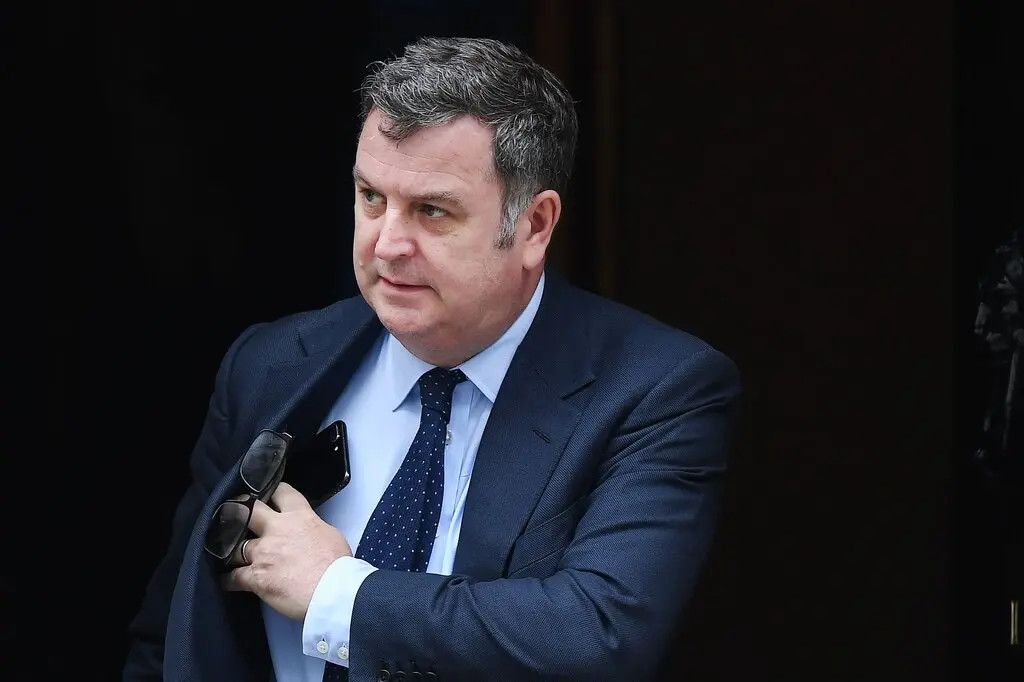
“We need a fundamental reset,” Mel Stride, a Conservative lawmaker who leads the House of Commons Treasury Select Committee, told the BBC.Credit...Andy Rain/EPA, via Shutterstock Analysts have expected that a wide re-evaluation of the government’s entire package of unfunded tax cuts could be in the cards, because the failure of successive policy reversals would only deepen the crisis. Speaking to the BBC, Mel Stride, a member of Ms. Truss’s Conservative Party who leads the House of Commons Treasury Select Committee, said he hoped that there would be a revision of the tax measures that Kwasi Kwarteng announced late last month. “I think things have reached a stage now with the markets, and with confidence in those financial markets, where we need a fundamental reset,” Mr. Stride said. The government has blamed global financial conditions, including the war in Ukraine, for the turmoil engulfing Britain. Prime Minister Liz Truss and Mr. Kwarteng had argued that the tax-cutting measures would spur economic growth and, they said, were to be accompanied by other changes that would make construction easier and that would relax immigration rules to help companies hire more workers. But skeptics doubted that Parliament would support those changes, and analysts said that Mr. Kwarteng’s tax-cutting announcement, on Sept. 23, was the catalyst for a market panic that threatens to push interest rates up higher than would have been necessary. One concern among investors was that the government had ignored expert advice. Before making last month’s announcement, Mr. Kwarteng fired the top official at the Treasury and sidelined the Office for Budget Responsibility, an independent watchdog that normally scrutinizes such announcements and gives a verdict on how public finances are being managed. The negative reaction of financial markets has acute political implications for the government because of the potential effects on home mortgage repayments for Britons whose rates are not fixed for long periods. The value of some pension funds has also dropped. Rachel Reeves, who speaks for the opposition Labour Party on the economy, said that “a humiliating U-turn is necessary,” but added that “the real damage has already been done to millions of ordinary people now paying much higher mortgages and struggling to make ends meet.” — Stephen Castle Support for the Conservatives has collapsed during Truss’s time as leader. 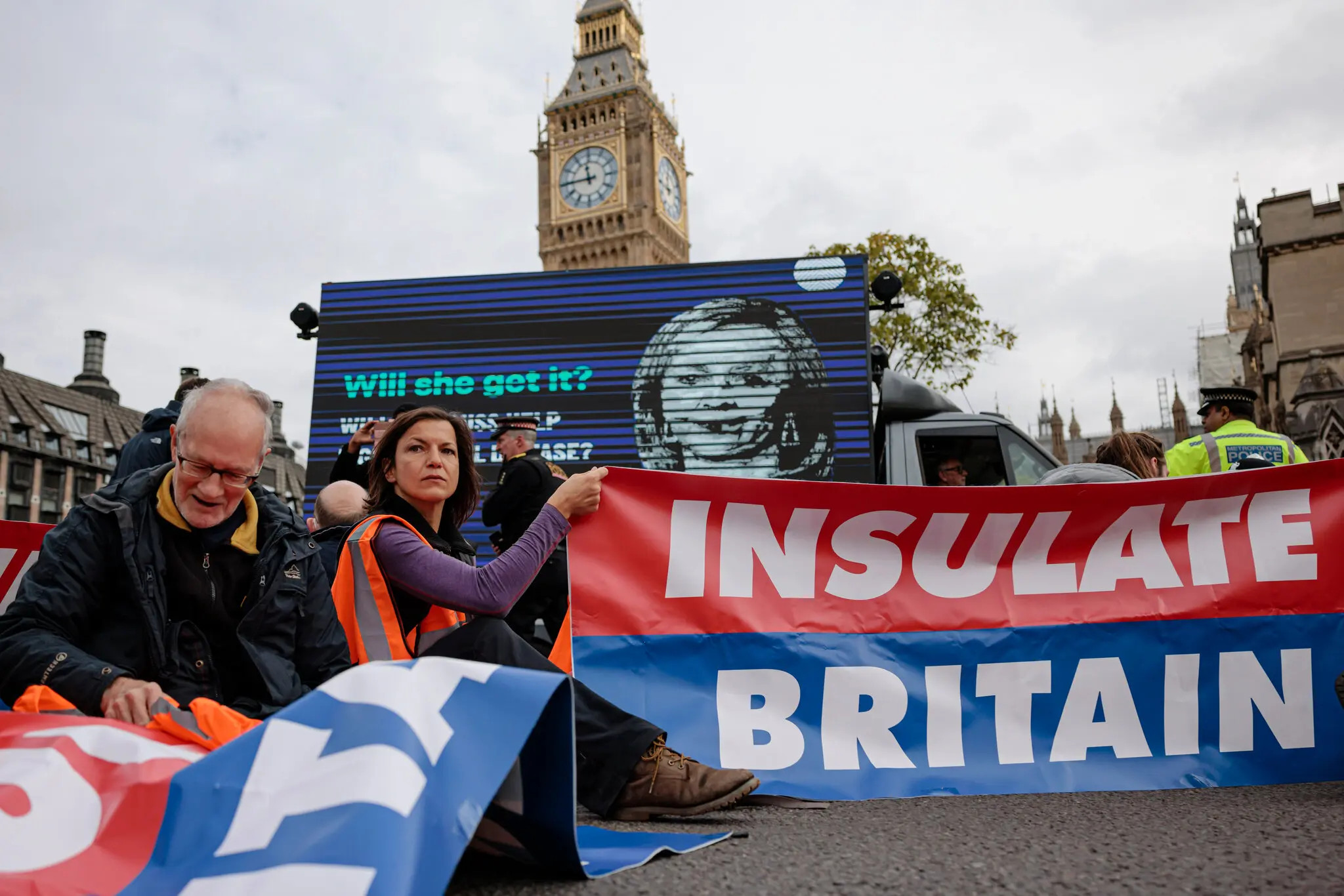
An advertising van carrying a picture of Prime Minister Liz Truss passing protesters as they blocked roads at Parliament Square in London on Wednesday.Credit...Rob Pinney/Getty Images In her short time in power, Prime Minister Liz Truss has presided over a collapse in opinion polls of support for her Conservative Party, with the opposition Labour Party gaining the sort of leads it last enjoyed in the 1990s. Having only just forced out a prime minister, Boris Johnson, Conservative lawmakers would have to change their rules to challenge Ms. Truss. Few want another protracted leadership contest, and any push to replace Ms. Truss is fraught with difficulties. A move to replace her is likely to succeed only if there is a consensus about who should take over, and there is no sign that Conservatives are in agreement. One idea, originally suggested on the ConservativeHome website, was that two other contenders in the last contest — Rishi Sunak, a former chancellor of the Exchequer, and Penny Mordaunt, a senior cabinet minister — could form a joint ticket. But there is no sign of any such consensus, and it is not clear that all Conservative lawmakers would accept it. — Stephen Castle Who is Jeremy Hunt, Britain’s new chancellor of the Exchequer? The conservative politician Jeremy Hunt at an interview outside the BBC studios in central London in July.Credit...Justin Tallis/Agence France-Presse — Getty Images Jeremy Hunt, who was appointed Britain’s chancellor of the Exchequer on Friday, is a former foreign minister and a pragmatist from the ideological center ground of conservative politics. The selection of a moderate with government experience appeared intended to restore calm to financial markets. Prime Minister Liz Truss of Britain named him to replace Kwasi Kwarteng, whom she had fired the same day, cutting short his tenure after just 38 days on the job and after he had introduced a tax plan that backfired and rattled financial markets. The dizzying speed of the turnover in a post that is normally associated with measured, and sometimes staid, authority sent a jolt through British politics, sharpening criticism of Ms. Truss from within her own party. Speaking at a news conference, Ms. Truss called Mr. Hunt “one of the most experienced and widely respected government ministers and parliamentarians — and he shares my convictions and ambitions for our country.” She said that he would “drive our mission to go for growth, including taking forward the supply-side reforms that our country needs,” and that he would deliver the government’s new fiscal plan at the end of the month. Mr. Hunt, who studied philosophy, politics and economics at Oxford University and was head boy at one of Britain’s leading private schools, was among the candidates to lead the party in 2019, finishing second to Boris Johnson, who then became prime minister. When Mr. Johnson himself resigned in July, Mr. Hunt ran again but was eliminated in the first round of the leadership fight, gaining just 18 votes from conservative colleagues. He went on to endorse Rishi Sunak, Mr. Johnson’s chancellor, for leader. The contest was eventually won by Ms. Truss. Mr. Hunt served as health secretary from 2012 to 2016. During the pandemic, he was chair of a parliamentary health committee, using the platform to scrutinize and at times challenge government health policy. Before that, he had served as culture secretary and handled the 2012 London Olympics and Paralympics, which were widely viewed as successes. Mr. Hunt is the fifth person to hold the office of chancellor of the Exchequer in just over three years, a reflection of the relative instability of governing politics during that period. By contrast, Gordon Brown, a Labour chancellor, served for a decade until 2007, while George Osbourne, who steered a policy of austerity in an effort to reduce Britain’s national debt, was in the job for six years, serving until 2016. Like his predecessors, Mr. Hunt will move into No. 11 Downing Street, a terraced house next door to the prime minister’s. — Matthew Mpoke Bigg U.K. markets remain troubled despite the finance minister’s ouster. 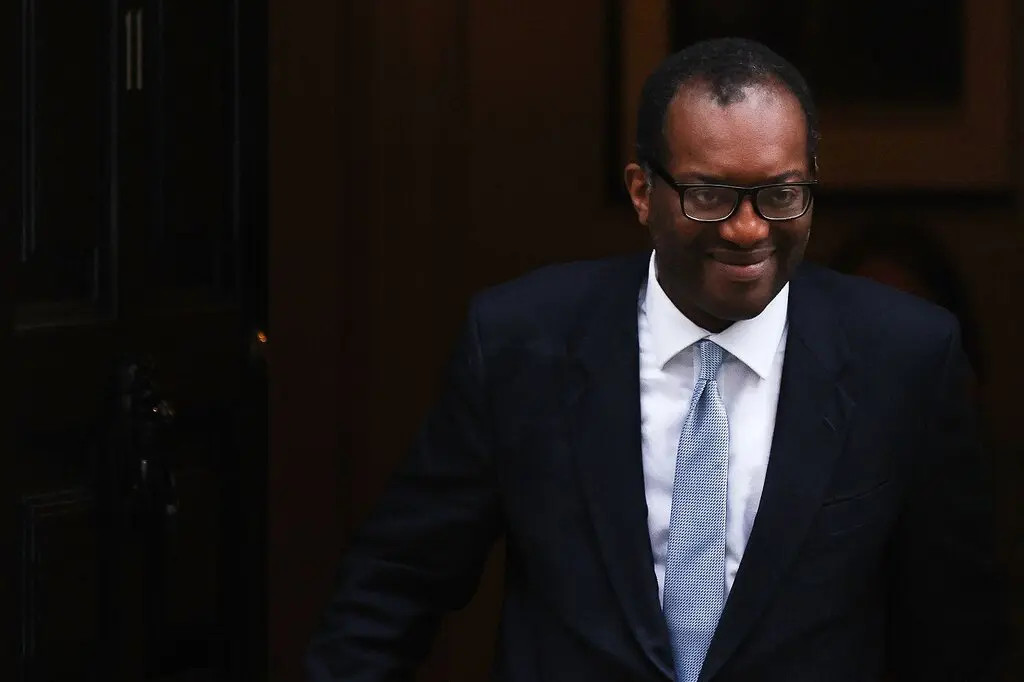
Kwasi Kwarteng, the former chancellor of the Exchequer.Credit...Isabel Infantes/Agence France-Presse — Getty Images Although Prime Minister Liz Truss of Britain on Friday fired the country’s top economic official in an effort to end the market turmoil that has raged for weeks, the move failed to fully soothe investors: The British pound fell, and recent gains made by government bonds were reversed. Just three weeks ago, Kwasi Kwarteng, the chancellor of the Exchequer, announced a plan to widely cut taxes that sent shock waves through Britain’s financial markets, forced a central bank intervention and drew international criticism. On Friday, Mr. Kwarteng was fired after flying back early from meetings in Washington, having served the second-shortest term as chancellor in Britain’s history, at just 38 days. But British assets still weakened in financial markets on Friday after Ms. Truss gave a short news conference. She announced that she would keep a planned increase in corporation tax rather than drop it. It was the fledgling government’s second major U-turn from the agenda it set out on Sept. 23; on Oct. 3, it scrapped its plan to drop the top rate of income tax. But Ms. Truss told reporters that she was committed to staying on and delivering her general economic agenda. “I am absolutely determined to see through what I have promised, to deliver a higher growth, more prosperous United Kingdom, to see us through the storm we face,” she said. Markets had already moved in response to speculation on Thursday that Ms. Truss would backtrack on some of the tax cuts, said Jane Foley, a strategist at Rabobank, and there was only a “teeny little” response to the dismissal of Mr. Kwarteng on Friday. The pound was more than 1 percent weaker against the dollar on Friday, after rising more than 2 percent the day before. The British currency rose slightly after Ms. Truss announced that she had replaced Mr. Kwarteng with Jeremy Hunt as chancellor; he will be the fourth chancellor this year. Mr. Hunt was a supporter of Rishi Sunak, another former chancellor and the last contender against Ms. Truss in the recent race for the Conservative Party leadership. But then the pound weakened again after Ms. Truss’s news conference. The yields on government bonds, an indicator of government borrowing costs, were rising, with 10-year yields at 4.2 percent, after falling to as low as 3.9 percent earlier in the day. While signs of a retreat by the government have offered some relief to markets this week, it leaves the government’s economic agenda in tatters and Britain without a clear path ahead while inflation is at its highest level in four decades and household budgets are squeezed by rising energy bills, higher mortgage rates and other rising costs. Data published this week showed that the British economy unexpectedly shrank in August, adding to expectations that Britain is headed for a recession. “We might get the U-turns, but what else?” Ms. Foley said. “What can any chancellor now do to dig the U.K. economy out of the hole that it’s in?” The pound was trading below $1.12, lower than where it was before the government’s policy statement on Sept. 23. Bond yields were still significantly higher then they were before the statement. The pound is still a vulnerable currency, Ms. Foley said. “Even though we may have pulled back from the abyss,” she added, “we’re not in a positive position.” — Eshe Nelson How Liz Truss became prime minister. 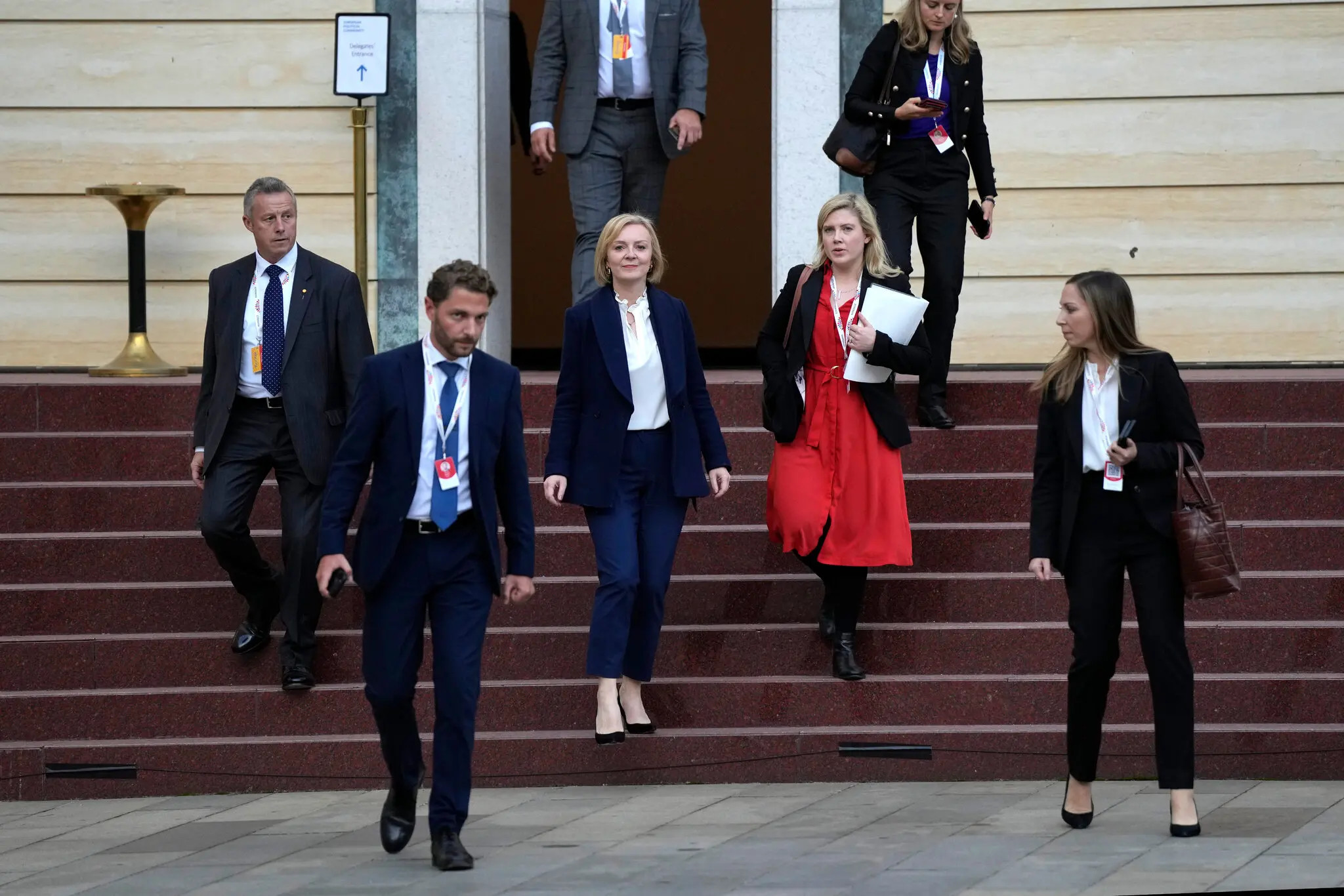
British Prime Minister Liz Truss, center, in Prague last week.Credit...Alastair Grant, Pool/AP LONDON — Three years ago, Boris Johnson led Britain’s Conservative Party to its biggest election victory in decades. Six years ago, Liz Truss was an important Conservative voice in the unsuccessful campaign for Britain to remain part of the European Union. But on Sept. 6, Mr. Johnson stepped down, forced out by his own party. And Ms. Truss replaced him after winning over the party’s right as a Brexit-championing foreign secretary. Once a student activist for a smaller, centrist party, the Liberal Democrats, Ms. Truss campaigned for Britain to remain in the European Union during the 2016 Brexit referendum — a key dividing line for the many Conservative members who voted to leave. But she remade herself as a champion of Brexit causes, pursuing aggressive negotiations with the European Union over trade in Northern Ireland. In the contest that led to her election as party leader, she also promised to pursue rapid tax cuts, to be financed by repaying pandemic debt over a longer period. That was a point of distinction with Rishi Sunak, her main competitor in the contest, who described the idea as “fantasy economics.” — Peter Robins and Stephen Castle © 2022 The New York Times Company
| The text being discussed is available at | and |
